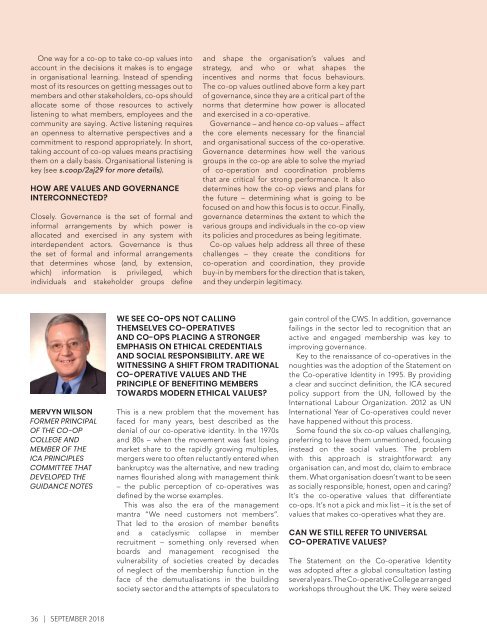SEPTEMBER 2018
The September edition of Co-op News looks at how co-ops cab maintain co-operative values and principles while operating in competitive markets and how this can be a challenge for large co-ops. We examine current research into what influences a co-op’s take on the traditional values of self-help, self-responsibility, democracy, equality, equity and solidarity.
The September edition of Co-op News looks at how co-ops cab maintain co-operative values and principles while operating in competitive markets and how this can be a challenge for large co-ops. We examine current research into what influences a co-op’s take on the traditional values of self-help, self-responsibility, democracy, equality, equity and solidarity.
You also want an ePaper? Increase the reach of your titles
YUMPU automatically turns print PDFs into web optimized ePapers that Google loves.
One way for a co-op to take co-op values into<br />
account in the decisions it makes is to engage<br />
in organisational learning. Instead of spending<br />
most of its resources on getting messages out to<br />
members and other stakeholders, co-ops should<br />
allocate some of those resources to actively<br />
listening to what members, employees and the<br />
community are saying. Active listening requires<br />
an openness to alternative perspectives and a<br />
commitment to respond appropriately. In short,<br />
taking account of co-op values means practising<br />
them on a daily basis. Organisational listening is<br />
key (see s.coop/2aj29 for more details).<br />
HOW ARE VALUES AND GOVERNANCE<br />
INTERCONNECTED?<br />
Closely. Governance is the set of formal and<br />
informal arrangements by which power is<br />
allocated and exercised in any system with<br />
interdependent actors. Governance is thus<br />
the set of formal and informal arrangements<br />
that determines whose (and, by extension,<br />
which) information is privileged, which<br />
individuals and stakeholder groups define<br />
and shape the organisation’s values and<br />
strategy, and who or what shapes the<br />
incentives and norms that focus behaviours.<br />
The co-op values outlined above form a key part<br />
of governance, since they are a critical part of the<br />
norms that determine how power is allocated<br />
and exercised in a co-operative.<br />
Governance – and hence co-op values – affect<br />
the core elements necessary for the financial<br />
and organisational success of the co-operative.<br />
Governance determines how well the various<br />
groups in the co-op are able to solve the myriad<br />
of co-operation and coordination problems<br />
that are critical for strong performance. It also<br />
determines how the co-op views and plans for<br />
the future – determining what is going to be<br />
focused on and how this focus is to occur. Finally,<br />
governance determines the extent to which the<br />
various groups and individuals in the co-op view<br />
its policies and procedures as being legitimate.<br />
Co-op values help address all three of these<br />
challenges – they create the conditions for<br />
co-operation and coordination, they provide<br />
buy-in by members for the direction that is taken,<br />
and they underpin legitimacy.<br />
MERVYN WILSON<br />
FORMER PRINCIPAL<br />
OF THE CO-OP<br />
COLLEGE AND<br />
MEMBER OF THE<br />
ICA PRINCIPLES<br />
COMMITTEE THAT<br />
DEVELOPED THE<br />
GUIDANCE NOTES<br />
WE SEE CO-OPS NOT CALLING<br />
THEMSELVES CO-OPERATIVES<br />
AND CO-OPS PLACING A STRONGER<br />
EMPHASIS ON ETHICAL CREDENTIALS<br />
AND SOCIAL RESPONSIBILITY. ARE WE<br />
WITNESSING A SHIFT FROM TRADITIONAL<br />
CO-OPERATIVE VALUES AND THE<br />
PRINCIPLE OF BENEFITING MEMBERS<br />
TOWARDS MODERN ETHICAL VALUES?<br />
This is a new problem that the movement has<br />
faced for many years, best described as the<br />
denial of our co-operative identity. In the 1970s<br />
and 80s – when the movement was fast losing<br />
market share to the rapidly growing multiples,<br />
mergers were too often reluctantly entered when<br />
bankruptcy was the alternative, and new trading<br />
names flourished along with management think<br />
– the public perception of co-operatives was<br />
defined by the worse examples.<br />
This was also the era of the management<br />
mantra “We need customers not members”.<br />
That led to the erosion of member benefits<br />
and a cataclysmic collapse in member<br />
recruitment – something only reversed when<br />
boards and management recognised the<br />
vulnerability of societies created by decades<br />
of neglect of the membership function in the<br />
face of the demutualisations in the building<br />
society sector and the attempts of speculators to<br />
gain control of the CWS. In addition, governance<br />
failings in the sector led to recognition that an<br />
active and engaged membership was key to<br />
improving governance.<br />
Key to the renaissance of co-operatives in the<br />
noughties was the adoption of the Statement on<br />
the Co-operative Identity in 1995. By providing<br />
a clear and succinct definition, the ICA secured<br />
policy support from the UN, followed by the<br />
International Labour Organization. 2012 as UN<br />
International Year of Co-operatives could never<br />
have happened without this process.<br />
Some found the six co-op values challenging,<br />
preferring to leave them unmentioned, focusing<br />
instead on the social values. The problem<br />
with this approach is straightforward: any<br />
organisation can, and most do, claim to embrace<br />
them. What organisation doesn’t want to be seen<br />
as socially responsible, honest, open and caring?<br />
It’s the co-operative values that differentiate<br />
co-ops. It’s not a pick and mix list – it is the set of<br />
values that makes co-operatives what they are.<br />
CAN WE STILL REFER TO UNIVERSAL<br />
CO-OPERATIVE VALUES?<br />
The Statement on the Co-operative Identity<br />
was adopted after a global consultation lasting<br />
several years. The Co-operative College arranged<br />
workshops throughout the UK. They were seized<br />
36 | <strong>SEPTEMBER</strong> <strong>2018</strong>


















